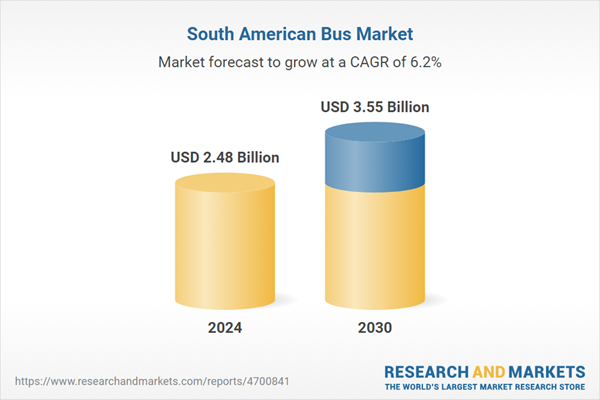Speak directly to the analyst to clarify any post sales queries you may have.
10% Free customizationThis report comes with 10% free customization, enabling you to add data that meets your specific business needs.
Market Drivers
Urban Population Growth Fuelling Demand for Mass Transit
As urban populations increase, the need for efficient and high-capacity public transportation systems becomes more critical. Buses offer an affordable and scalable solution for moving large numbers of people across cities where private vehicle ownership is often unsustainable due to congestion and pollution. The rising population density in metropolitan areas pushes local authorities and private operators to invest in larger and more frequent bus fleets to reduce commuter wait times and improve access to workplaces, schools, and services. Urban expansion creates new residential and commercial zones that require dependable transport connectivity, further boosting demand for buses.For instance, South America is one of the most urbanized regions globally, with over 80% of its population residing in cities, and is characterized by the presence of primate cities dominant urban centers like Montevideo, where over half of Uruguay's population lives. The region also hosts several megacities such as Mexico City (22 million), São Paulo (21.5 million), Rio de Janeiro, and Buenos Aires, all facing significant challenges related to housing, employment, slum development, and infrastructure management. These urban concentrations intensify the demand for efficient transportation, sanitation, and urban planning in countries often struggling to meet these needs.
Key Market Challenges
High Capital Investment for Fleet Modernization
Modernizing bus fleets with electric, hybrid, or smart technology-enabled vehicles involves substantial upfront capital expenditure. While long-term operational savings can offset some of the costs, the initial purchase price of electric or low-emission buses remains significantly higher than traditional diesel models. This presents a major hurdle for both public and private operators, particularly in environments with limited financial resources or constrained public budgets.Procurement of charging infrastructure, retraining of maintenance personnel, and upgrades to service depots also contribute to overall modernization expenses. Fleet operators are often required to rely on loans, subsidies, or public-private partnerships to afford these investments, making the pace of transition heavily dependent on external financial support. Cost sensitivity becomes even more prominent in areas with unpredictable ridership or farebox revenue recovery. High capital costs can lead to deferred fleet upgrades, continued reliance on older polluting buses, and slowed adoption of new technologies.
Key Market Trends
Integration of Smart Mobility Solutions
Technology is transforming the way buses operate and interact with passengers, marking a major trend in public transport modernization. The integration of smart mobility solutions such as real-time tracking, mobile ticketing, contactless payments, and passenger information systems is redefining service reliability and user experience. Operators are leveraging telematics and IoT-enabled devices to monitor vehicle health, optimize routes, and ensure driver compliance, thereby reducing downtime and improving efficiency. Passengers benefit from improved transparency, with access to live bus locations, estimated arrival times, and digital fare systems through mobile apps.These innovations are fostering convenience, safety, and time savings. Predictive maintenance using AI and data analytics is also gaining traction, allowing proactive service interventions and longer vehicle lifespans. Traffic management systems integrated with bus fleets enable dynamic rerouting in response to congestion, minimizing delays and fuel consumption. These smart tools also generate valuable data for city planners to enhance transportation policy and infrastructure development.
Key Market Players
- Anhui Ankai Automobile Co. Ltd
- Ashok Leyland Limited
- Byd Auto Industry Company Limited
- Daimler Truck Holding AG
- King Long United Automotive Industry Co. Ltd.
- NFI Group Inc.
- Proterra INC.
- Tata Motors Limited
- Volvo Group
- Zhengzhou Yutong Bus Co. Ltd
Report Scope:
In this report, the South America Bus Market has been segmented into the following categories, in addition to the industry trends which have also been detailed below:South America Bus Market, By Application:
- Transit Buses
- Motor Coaches
- School Buses/Others
South America Bus Market, By Length:
- 6-8m
- 8-10m
- 10-12m
- Above 12m
South America Bus Market, By Seating Capacity:
- 15-30
- 30-40
- 40-50
- Above 50
South America Bus Market, By Propulsion:
- ICE
- Electric
South America Bus Market, By Country:
- Brazil
- Peru
- Colombia
- Chile
- Argentina
- Venezuela
Competitive Landscape
Company Profiles: Detailed analysis of the major companies present in the South America Bus Market.Available Customizations:
With the given market data, the publisher offers customizations according to the company’s specific needs. The following customization options are available for the report.Company Information
- Detailed analysis and profiling of additional market players (up to five).
Table of Contents
Companies Mentioned
- Anhui Ankai Automobile Co. Ltd
- Ashok Leyland Limited
- Byd Auto Industry Company Limited
- Daimler Truck Holding AG
- King Long United Automotive Industry Co. Ltd.
- NFI Group Inc.
- Proterra INC.
- Tata Motors Limited
- Volvo Group
- Zhengzhou Yutong Bus Co. Ltd
Table Information
| Report Attribute | Details |
|---|---|
| No. of Pages | 135 |
| Published | August 2025 |
| Forecast Period | 2024 - 2030 |
| Estimated Market Value ( USD | $ 2.48 Billion |
| Forecasted Market Value ( USD | $ 3.55 Billion |
| Compound Annual Growth Rate | 6.1% |
| No. of Companies Mentioned | 10 |









